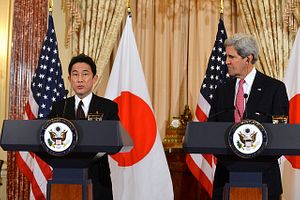While Japan is not a party to the Joint Comprehensive Plan of Action (JCPOA), popularly known as “the Iran nuclear deal,” it played an important role in the conclusion of this international agreement and could be influential in its implementation. The global sanctions regime that helped drive Iran to the negotiating table depended upon the participation of major economic players like Japan. In concert with its U.S. ally and the rest of the international community, Japan endured economic costs in pursuit of shared nuclear nonproliferation principles and broader national interests. The JCPOA is an underappreciated example of cooperation between the United States and Japan on this front.
However, as the one-year anniversary of the JCPOA approaches in July, U.S. and Japanese interests are showing signs of divergence. Japan is expanding investment in Iran’s energy sector while the United States remains at odds with Iran over non-nuclear issues. How will Japan’s deepening economic partnership with Iran impact international nonproliferation efforts and the U.S.-Japan Alliance?
In his official response to the JCPOA, Japanese Foreign Minister Fumio Kishida cited the “historically friendly relationship between Japan and Iran.” Prior to the imposition of UN sanctions on Iran’s nuclear program, Japanese corporations were heavily invested in Iran. As a resource-poor country that depends on crude oil imports for more than 40 percent of its energy, Japan had been importing oil from Iran for decades.
In 2010, Iran was the source of almost 10 percent of Japan’s oil imports, and this percentage increased after the Fukushima Daiichi nuclear disaster in March 2011 and the energy crisis that ensued. Despite this energy crisis and its good relations with Iran, in 2012 Japan supported the U.S.-led sanctions regime on Iran by cutting its oil imports from Iran by nearly 80 percent, a blow to the Iranian economy that certainly helped to push Iran to the negotiating table.
Now that the JCPOA has been implemented, Japan has lifted its sanctions and is importing more oil from Iran. On February 5, the two nations signed a bilateral investment agreement, which promises $10 billion in export credits from the Japan Bank for International Cooperation, guaranteed by Nippon Export and Investment Insurance – both of which are arms of the Japanese government. With 65 percent of Japan’s oil imports currently coming from only two countries, Saudi Arabia and the United Arab Emirates, Iran provides an opportunity for Japan to diversify its sources of energy. For Iran, still recovering from the effects of sanctions, oil-hungry Japan can contribute to its economic recovery. As a further sign of the economic ties between the two nations, Prime Minister Shinzo Abe is expected to visit Tehran this summer, the first visit by a Japanese leader to Iran in thirty-eight years.
In contrast to the cordial relations between Tokyo and Tehran, it is difficult to imagine anyone in Washington describing U.S.-Iran relations as “historically friendly.” Washington is expected to maintain non-nuclear sanctions on Iran for its ballistic missile program, support of terrorism, and human rights violations. In addition, the United States can unilaterally force the reimposition of UN sanctions related to Iran’s nuclear program through the “snapback” mechanism in the JCPOA. There are a number of real potential Iranian violations that could invoke an outcry in the United States and spark demands to reimpose sanctions. It is also not difficult to imagine a future U.S. administration, especially one that is politically opposed to the JCPOA, using a minor implementation problem as a convenient excuse to reimpose sanctions.
Japan, for the reasons discussed above, will be more measured in response to any potential Iranian violation. And once Japanese business interests again become entrenched in Iran, it might be difficult to convince Tokyo to participate in a renewed sanctions regime, especially if it believes that Washington’s position is politically motivated.
That said, Japan’s support will be crucial to any U.S. effort to regain international support for a sanctions regime. Japanese skepticism about the severity of a violation would undermine the credibility of U.S. claims. Furthermore, while the snapback provision allows for automatic reinstatement of UN-mandated sanctions, states must voluntarily agree to abide by any U.S.-imposed sanctions. And a lack of support from Japan, a major investor in Iran’s oil and gas sectors, would severely reduce the bite of any new U.S. sanctions.
To be sure, U.S. policymakers should not view Japan’s ties with Iran as an obstacle to implementation of the Iran deal. After all, in 2012 Japan proved itself willing to sacrifice its own economic interest for the sake of nonproliferation and the U.S.-Japan alliance. Moreover, the fear of severed economic ties with Japan might make Iran think twice about testing the limits of the JCPOA.
Ultimately, what is important is that the United States and Japan reach some common understanding on the scenarios that could legitimately justify a return to sanctions. These standards should not be made public – the uncertainty can help restrain Iranian activities, and a clear framework of violations will give Iran more opportunities to find loopholes. However, it is important that the United States and its allies are on the same page – both to demonstrate to Iran the severity of the costs of its actions, and to maintain the strength of these alliances.
If they have not already privately done so, the United States and Japan should ensure that this common understanding on violations is spelled out in some sort of formal or informal bilateral agreement before the 2016 U.S. presidential election. While such an agreement may not stop a future president from trying to undermine the Iran deal, it will present one additional consequence to consider.
Cory McKenzie is a junior fellow in the Asia Program at the Carnegie Endowment for International Peace, and William Ossoff is a junior fellow in the Nuclear Policy Program at the Carnegie Endowment for International Peace. They wrote this piece following discussions at a Carnegie conference, “From Pyongyang to Tehran: U.S. and Japanese Perspectives on Nuclear Deals,” held on March 28, 2016.

































